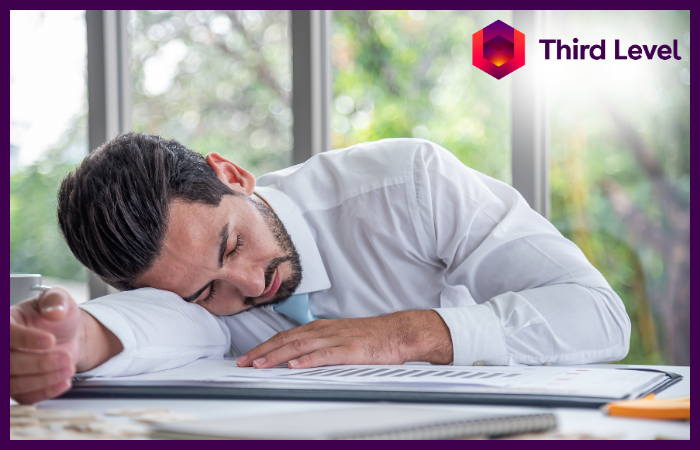
Blog Post
Lack of Sleep And Your Job Performance
September 1, 2024 / Category: Third Level

Feeling sluggish and unproductive at work? The culprit might be lurking in your sleep habits. Lack of sleep can have a profound impact on your job performance, affecting everything from concentration and decision-making to mood and overall well-being. Read our insights and learn to prioritize sleep for optimal productivity and job satisfaction.
Leadership training equips individuals with the skills to manage not only their own performance but also that of their teams. It fosters a proactive approach to addressing issues such as sleep deprivation, emphasizing the importance of work-life balance and self-care. Effective leaders understand that their personal well-being directly influences their ability to lead effectively. By prioritizing sleep and well-being, they set a positive example for their team members, creating a culture that values health and productivity.
Americans are not getting enough sleep. In fact, according to the latest Gallup study, more than half of Americans report they need more sleep, with women being the demographic least likely to get the sleep they need.At the same time, the number of Americans who are stressed has been on a steady incline, a fact that is deeply intertwined with our sleep: People who sleep less are more stressed, and those who are more stressed sleep less.
If workers are more stressed and more sleep-deprived, could it be impacting their work? Here’s what you need to know about sleep and its impact on your career.
Leadership training enhances decision-making capabilities under stress. Sleep deprivation can impair cognitive functions critical for making sound judgments and strategic choices. Through training, leaders learn techniques to mitigate these effects, such as mindfulness practices and time management strategies. They are better equipped to recognize signs of fatigue in themselves and their teams, taking proactive steps to optimize performance and prevent burnout.
How important is sleep anyway?
The Center for Disease Control and Prevention says adults need seven or more hours of sleep per night. Those who don’t get enough quality sleep have an increased risk of developing cancer, depression and chronic diseases like diabetes, heart disease and obesity.Poor sleep quality can also lead to mental fatigue, which can affect your alertness, learning, memory, thinking and ability to perform functions.
How sleep impacts your work
In 2022, California became the first state torequire high schools to start no earlier than 8:30 a.m. because there was enough compelling research showing that later start times would increase adolescents’ sleep and improve student performance and wellbeing. Lack of sleep negatively impacts job performance, productivity, career progression and satisfaction, and it could lead to an increase in job-related accidents, absenteeism and counterproductive work behaviors. At the same time, better sleep has been linked to improved memory, learning and overall comprehension, and it tends to drive better employee engagement.
Which jobs are most impacted by sleep deprivation?
A new study by Wen-Jui Han, NYU Silver School of Social Work professor, shows that working nights and volatile schedules (like part-time jobs) in young adulthood impacts your health in middle age. Han examined 7,000 Americans’ work schedules and sleep patterns from the ages of 22 through 50. Over the three decades, those who worked a night shift or had rotating work schedules reported less sleep and a greater likelihood of poor health and depression at age 50 than those with more stable schedules and daytime hours. And, according to the data, Black men, women and workers with limited education disproportionately had jobs outside of a traditional 9-to-5. “Our work now is making us sick and poor,” Han told NPR. “Work is supposed to allow us to accumulate resources. But, for a lot of people, their work doesn’t allow them to do so. They actually become more and more miserable over time.” All of this could be contributing to the staggering number of burnout among workers and the resulting pushback against hustle culture among younger generations. About 16% of American workers were employed outside of daytime hours in 2019, according to the U.S. Bureau of Labor Statistics. Yet, research has also shown that sleep, diet and social habits required to work nights and rotating shifts can also increase a worker’s risk of developing diabetes. “Poor sleep is a risk factor for diabetes that very often we do not talk about,” Dr. Alyson Myers, endocrinologist and professor at the Albert Einstein College of Medicine, explained to NPR.
Tips for improving your sleep quality
The science is very clear—most of us would likely do better with more sleep. Particularly people who work outside of typical daytime hours.
There’s a lot of information out there on how to get better sleep, ranging from removing all devices from the bedroom to avoiding caffeinated beverages after noon to trying not to sleep. It can be overwhelming to sift through them all.So, we spoke with sleep experts who narrowed tips down based on industries with fewer regular business hours. Here’s what they recommend:
Create a sleep-conducive environment
Especially important for: Healthcare workers, first responders like firefighters and police officers
A bedroom conducive to sleep should be cool, quiet and dark. This is especially important for people who work night shifts and often sleep during the day.
“Exposure to bright light when you start your shift can help you feel more alert,” Dr. Sahil Chopra, MD, CEO and Co-Founder of Empower Sleep, said. “Also, avoid bright light when approaching bedtime. Use blackout curtains or a sleep mask to block out light when sleeping during the day.”You can also try using earplugs and white noise machines to block out disruptive sounds.
Set a sleep schedule and stick to it
Especially important for: Healthcare and hospitality workers, first responders
Consider creating a sleep schedule that complements your work schedule. Even if you’re someone who works nights or rotating shifts, sleep experts highly recommend you try to keep your bedtime and wake-up times as consistent as possible. This will help regulate your body’s internal clock and improve your overall sleep quality.
“Maintaining a consistent schedule trains your body to fall asleep and stay asleep once your head hits the pillow,” said Dr. Dan Gartenberg, Ph.D., sleep scientist and founder of SleepSpace. “This can improve your mental and physical health, while also increasing energy and productivity.”
Create a wind-down period before sleeping
Especially important for: Journalists, law enforcement and entertainment workers
Developing a pre-sleep routine to transition from high alertness to a more relaxed state can signal to your body that it’s time to wind down.
“This could involve reading, stretching, or practicing relaxation techniques like mindfulness or deep breathing or guided imagery,” said Dr. Chopra. “Even if this is 15 minutes, it will help your mind to put aside work and prepare for sleep.”
Limit your blue light exposure in the evening
Especially important for: People who work in front of a computer
The blue light emitted by screens can interfere with melatonin production and make it harder for you to fall asleep. Consider dimming lights in the evening and enable Android’s “Bedtime Mode” or Apple’s “Night Shift” on your phone and computer, which will adjust the display color on your device to a warmer tone that reduces your blue light exposure.
Practice self-care regularly
Especially important for: Educators, healthcare and first responders
Some roles can be very emotionally demanding and more susceptible to burnout. For example, teachers who look after students facing difficulties or nurses caring for patients in hospice. These workers could likely benefit from prioritizing self-care activities like yoga, meditation or spending time in nature to promote relaxation.
Dr. Chopra also recommends people working in intensive environments implement stress-reducing techniques such as debriefings after tough calls, peer support groups and professional counseling.
Manage and minimize your stress
Especially important for: All workers
Setting boundaries between work and personal life is a huge factor in managing and reducing your stress levels. This could look like snoozing notifications after 6 p.m. to disconnect from work emails and news alerts. Or educators might consider avoiding grading papers or lesson planning right before bed.
“Finding time to relax can also significantly impact sleep health. When done correctly, relaxation techniques reduce stress hormones that contribute to poor sleep,” explained Dr. Gartenberg. “These habits differ from person to person, but I suggest focusing on things that won’t overstimulate the brain, like reading, sound therapy, breathing exercises or meditation.”
Discover the transformative power of rest and recharge your leadership journey. Our leadership coaches can prepare your team for peak performance. Schedule an appointment today. Find us on Instagram @ThirdlevelTeams.
Reference: [https://www.indeed.com/career-advice/news/poor-sleep-habits-affect-work-wellbeing]






